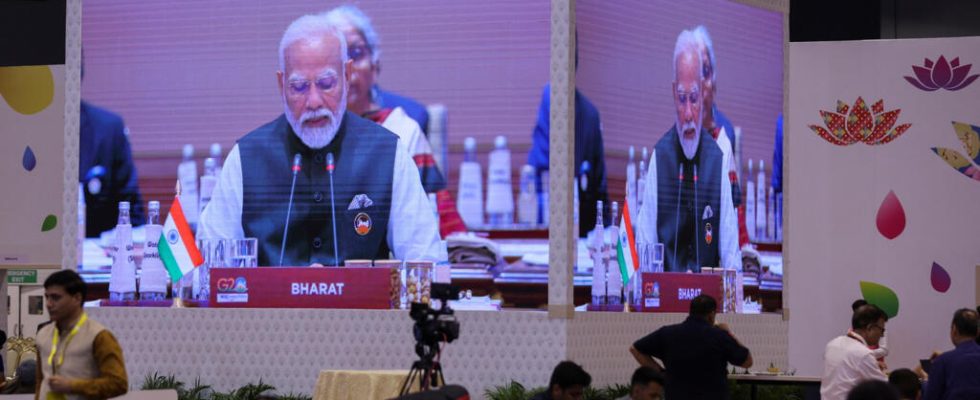The G20 summit is open in New Delhi for two days, in the presence of around thirty heads of state and international organizations. But in the absence of the Russian and Chinese presidents. The group of 19 richest countries and the European Union will try to agree on the crucial issues of financing the debt of developing countries, the climate transition, and the war in Ukraine.
2 mins
with our special correspondent, Dominique Baillard and our correspondent, Sébastien Farcis
After welcoming his guests in a brand new Convention Center, built for the event, Prime Minister Narendra Modi took the floor, a speech broadcast by television.
This opening session of the summit is first and foremost the staging of the Indian model that Narendra Modi now wants to disseminate throughout the world. India, which has become the most populous country in the world, the fifth economy on the planet, wants to be heard in the concert of nations. “It can become a guiding principle for the well-being of the world,” explained Narendra Modi very seriously in an interview given just before the summit. Concrete illustration with the formal invitation launched to the African Union to join the G20. ” With the approval of all, I call on the head of the AU to take his place as a permanent member of the G20”Mr. Modi said in his opening speech to the summit, with the African Union chief then taking his place alongside the group’s leaders.
One earth, one family, one futurea land, a family and a future), this is the slogan, the very consensual narrative developed by India for this G20. It will be presented during the three sessions of the day. An idealized vision quite far from reality, the Secretary General of the United Nations recalled yesterday. This G20 is the meeting of a dysfunctional family according to Antonio Guterres. Never have the divisions been so great between the 19 countries combined – remember that Vladimir Putin and Xi Jinping are absent.
The G20 is divided over Ukraine. But not only that: the climate commitments that will be discussed this morning are also divisive. India, the proclaimed champion of multilateralism, is one of the countries which, along with Russia, China and Saudi Arabia, are blocking the objectives proposed by the West, namely reducing emissions by 60% by 2035. The tripling of renewable energy capacities is another dividing line.
Ahead of this summit, US President Joe Biden spoke with Indian Prime Minister Narendra Modi. And it was mainly about new technologies
In the absence of the Chinese number one, the Indian leader confirmed that he was distancing himself from Beijing – and reaffirmed his support for the American program Rip and Replace, which prohibits American companies from using Chinese technologies for 5G. A measure which has already been applied in India during the launch of this technology, recalls our correspondent, Sébastien Farcis.
The two leaders then spoke about the establishment of two joint working groups for the research and development of a new 5 and 6G technology, called Open RAN, which makes it possible to depend less on manufacturers’ hardware for these communications. Finally, there was talk of the development of the semiconductor industry in India, while two American companies announced investments of more than a billion euros in the field, in order to open factories and centers of research in India. Finally, Joe Biden took the height, so to speak, by congratulating Narendra Modi for thesuccessful moon landing of Indian robot last month, and confirmed NASA’s willingness to work with the Indian space agency for a joint program to send astronauts into space.
